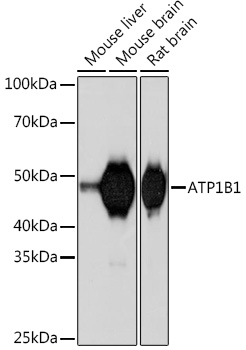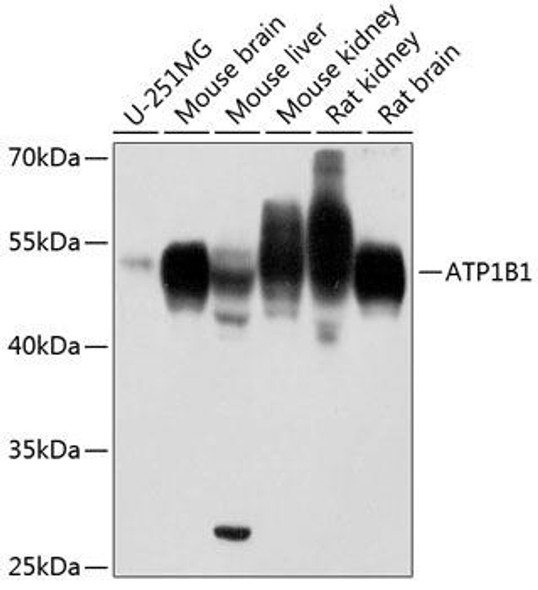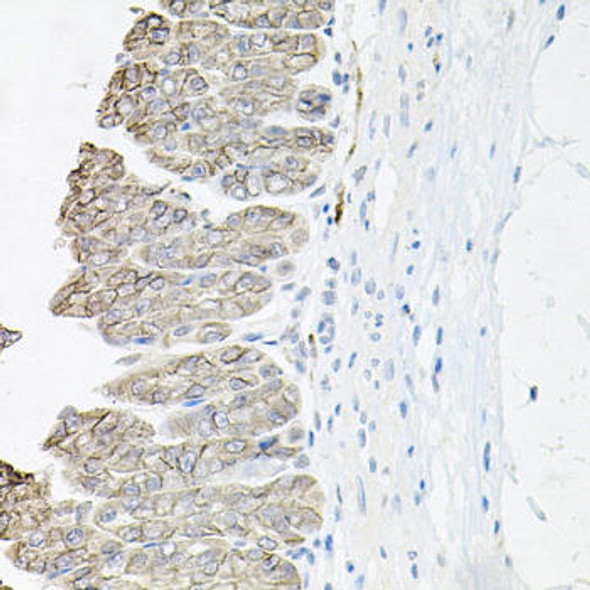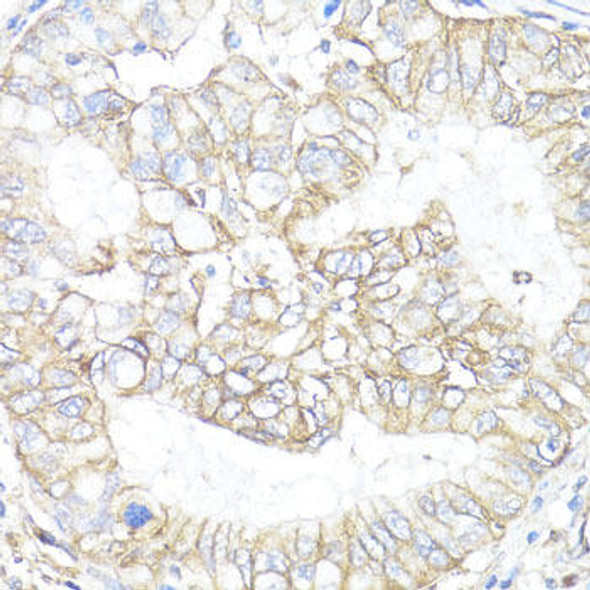Cell Biology Antibodies 17
Anti-ATP1B1 Antibody (CAB5113)
- SKU:
- CAB5113
- Product Type:
- Antibody
- Reactivity:
- Human
- Reactivity:
- Mouse
- Reactivity:
- Rat
- Host Species:
- Rabbit
- Isotype:
- IgG
- Research Area:
- Cell Biology
Description
| Antibody Name: | Anti-ATP1B1 Antibody |
| Antibody SKU: | CAB5113 |
| Antibody Size: | 20uL, 50uL, 100uL |
| Application: | WB IHC |
| Reactivity: | Human, Mouse, Rat |
| Host Species: | Rabbit |
| Immunogen: | A synthesized peptide derived from human ATP1B1 |
| Application: | WB IHC |
| Recommended Dilution: | WB 1:500 - 1:2000 IHC 1:50 - 1:200 |
| Reactivity: | Human, Mouse, Rat |
| Positive Samples: | U2OS, Mouse liver, Mouse brain, Rat brain |
| Immunogen: | A synthesized peptide derived from human ATP1B1 |
| Purification Method: | Affinity purification |
| Storage Buffer: | Store at -20'C. Avoid freeze / thaw cycles. Buffer: PBS with 0.02% sodium azide, 0.05% BSA, 50% glycerol, pH7.3. |
| Isotype: | IgG |
| Sequence: | Email for sequence |
| Gene ID: | 481 |
| Uniprot: | P05026 |
| Cellular Location: | |
| Calculated MW: | 40-50kDa |
| Observed MW: | 50KDa |
| Synonyms: | ATP1B |
| Background: | The protein encoded by this gene belongs to the family of Na+/K+ and H+/K+ ATPases beta chain proteins, and to the subfamily of Na+/K+ -ATPases. Na+/K+ -ATPase is an integral membrane protein responsible for establishing and maintaining the electrochemical gradients of Na and K ions across the plasma membrane. These gradients are essential for osmoregulation, for sodium-coupled transport of a variety of organic and inorganic molecules, and for electrical excitability of nerve and muscle. This enzyme is composed of two subunits, a large catalytic subunit (alpha) and a smaller glycoprotein subunit (beta). The beta subunit regulates, through assembly of alpha/beta heterodimers, the number of sodium pumps transported to the plasma membrane. The glycoprotein subunit of Na+/K+ -ATPase is encoded by multiple genes. This gene encodes a beta 1 subunit. Alternatively spliced transcript variants encoding different isoforms have been described, but their biological validity is not known. [provided by RefSeq, Mar 2010] |
| UniProt Protein Function: | ATP1B1: This is the non-catalytic component of the active enzyme, which catalyzes the hydrolysis of ATP coupled with the exchange of Na(+) and K(+) ions across the plasma membrane. The beta subunit regulates, through assembly of alpha/beta heterodimers, the number of sodium pumps transported to the plasma membrane. Belongs to the X(+)/potassium ATPases subunit beta family. 2 isoforms of the human protein are produced by alternative splicing. |
| UniProt Protein Details: | Protein type:Transporter; Membrane protein, integral Chromosomal Location of Human Ortholog: 1q24 Cellular Component: apical plasma membrane; basolateral plasma membrane; caveola; intracellular; membrane; myelin sheath; plasma membrane; sarcolemma; sodium:potassium-exchanging ATPase complex Molecular Function:ATP binding; ATPase activator activity; ATPase activity; ATPase binding; drug binding; potassium ion binding; protein binding; protein C-terminus binding; sodium ion binding; sodium:potassium-exchanging ATPase activity Biological Process: ATP metabolic process; blood coagulation; cardiac muscle contraction; cell adhesion; cellular calcium ion homeostasis; cellular potassium ion homeostasis; cellular sodium ion homeostasis; establishment and/or maintenance of transmembrane electrochemical gradient; leukocyte migration; positive regulation of ATPase activity; positive regulation of defense response to virus by host; potassium ion import; protein stabilization; regulation of gene expression; response to hypoxia; transmembrane transport Disease: Hypertension, Essential |
| NCBI Summary: | The protein encoded by this gene belongs to the family of Na+/K+ and H+/K+ ATPases beta chain proteins, and to the subfamily of Na+/K+ -ATPases. Na+/K+ -ATPase is an integral membrane protein responsible for establishing and maintaining the electrochemical gradients of Na and K ions across the plasma membrane. These gradients are essential for osmoregulation, for sodium-coupled transport of a variety of organic and inorganic molecules, and for electrical excitability of nerve and muscle. This enzyme is composed of two subunits, a large catalytic subunit (alpha) and a smaller glycoprotein subunit (beta). The beta subunit regulates, through assembly of alpha/beta heterodimers, the number of sodium pumps transported to the plasma membrane. The glycoprotein subunit of Na+/K+ -ATPase is encoded by multiple genes. This gene encodes a beta 1 subunit. Alternatively spliced transcript variants encoding different isoforms have been described, but their biological validity is not known. [provided by RefSeq, Mar 2010] |
| UniProt Code: | P05026 |
| NCBI GenInfo Identifier: | 114392 |
| NCBI Gene ID: | 481 |
| NCBI Accession: | P05026.1 |
| UniProt Secondary Accession: | P05026,Q5TGZ3, |
| UniProt Related Accession: | P05026 |
| Molecular Weight: | 34,893 Da |
| NCBI Full Name: | Sodium/potassium-transporting ATPase subunit beta-1 |
| NCBI Synonym Full Names: | ATPase Na+/K+ transporting subunit beta 1 |
| NCBI Official Symbol: | ATP1B1 |
| NCBI Official Synonym Symbols: | ATP1B |
| NCBI Protein Information: | sodium/potassium-transporting ATPase subunit beta-1 |
| UniProt Protein Name: | Sodium/potassium-transporting ATPase subunit beta-1 |
| UniProt Synonym Protein Names: | Sodium/potassium-dependent ATPase subunit beta-1 |
| UniProt Gene Name: | ATP1B1 |
| UniProt Entry Name: | AT1B1_HUMAN |







